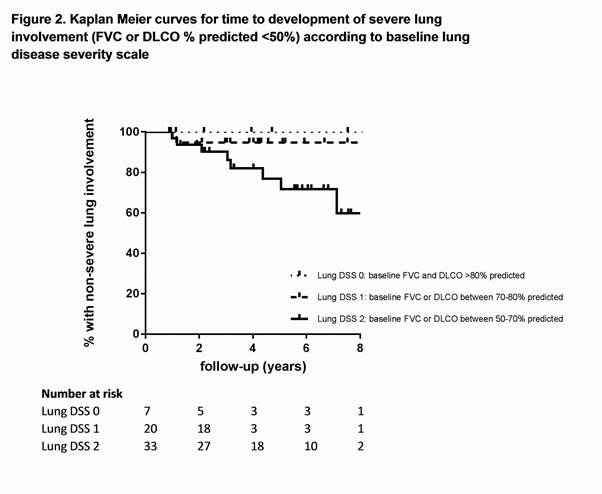Session Information
Session Type: ACR Poster Session A
Session Time: 9:00AM-11:00AM
Background/Purpose:
SSc is known for its heterogeneous disease course in which anti-topoisomerase I antibodies (ATA) are associated with dcSSc and interstitial lung disease and therefore regarded as marker for high-risk disease. In this study we aimed to describe disease course in ATA+ SSc patients.
Methods:
Data of ATA+ patients included in the Leiden Systemic Sclerosis cohort (CCISS) between April 1st 2009 and May 1st 2016 were collected. Medsger Disease Severity Scale (DSS), providing a 0-4 score on 9 organ systems (0 normal to 4 severely affected; organ systems: general, peripheral vascular, skin, joint/tendon, muscle, GI tract, lung, heart and kidney) were calculated in all patients at baseline. Maximum disease score was determined, taking disease duration into account by stratifying the patients in 3 groups: 1. incident cases, 2, early disease, disease duration since first non-Raynaud =< 5 years, 3. prevalent disease, disease duration since first non-Raynaud > 5 years. Disease progression over time with specific focus on pulmonary involvement was assessed. For this purpose Kaplan Meier analysis assessing deterioration towards severe lung involvement (Lung DSS ≥3) was performed in patients with non-severe lung involvement (Lung DSS ≤2), with stratification for baseline severity score.
Results:
Ninety-five patients were included in the current study. At baseline, median disease duration since first non-Raynaud symptom was 2.7 years (IQR 0.7-9.3). Evaluation of disease severity at baseline showed that mild / moderately severe disease (DSS scale 0, 1 and 2) was present among all subgroups including in 36% of patients with disease duration > 5 years (Figure 1). Longitudinal follow-up was available in 85 patients, with a median follow-up time of 3.2 years. Disease progression occurred in 48 patients (57%) and 2/49 lcSSc patients developed dcSSc over time. Of the 60 patients with non-severe pulmonary involvement at baseline, 9 (15%) developed severe pulmonary involvement over time, in which baseline Medsger Disease Severity Scale was a significant predictor (Figure 2).
Conclusion:
ATA+ SSc has a heterogeneous disease course, in which more than one-third of patients never develop severe organ involvement. Patients with normal lung function tests including FVC ≥70% at baseline are unlikely to develop severe lung disease during follow-up. These data show that additional characteristics are needed to identify patients in need of therapy targeting SSc-related ILD.
To cite this abstract in AMA style:
Boonstra M, Ninaber MK, Ajmone Marsan N, Scherer HU, Huizinga TWJ, de Vries-Bouwstra J. Longitudinal Follow-up of Anti-Topoisomerase I Positive Patients within the Leiden Systemic Sclerosis Cohort – Prognosis Infaust? [abstract]. Arthritis Rheumatol. 2018; 70 (suppl 9). https://acrabstracts.org/abstract/longitudinal-follow-up-of-anti-topoisomerase-i-positive-patients-within-the-leiden-systemic-sclerosis-cohort-prognosis-infaust/. Accessed .« Back to 2018 ACR/ARHP Annual Meeting
ACR Meeting Abstracts - https://acrabstracts.org/abstract/longitudinal-follow-up-of-anti-topoisomerase-i-positive-patients-within-the-leiden-systemic-sclerosis-cohort-prognosis-infaust/


